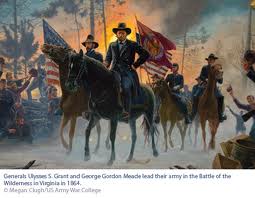LESSONS LEARNED FROM GRANT’S ‘WILDERNESS CAMPAIGN’
Ulysses S. Grant reached his goal, that of winning the Civil War for his commander in chief, against all odds, with resource allocation challenges, and in competition with an adversary who could out-gun, out-ride and physically out-last his Army.
Grant’s troops were city dwellers who did not know how to ride or care for a horse, did not know how to load or fire a weapon, were physically unfit, whose morale was damaged, and who lacked cohesion with their units or loyalty to the ‘cause’.
And they were fighting an opponent with all the skills they lacked plus an additional expertise in guerrilla warfare.
What he and his men lacked in field training and ‘esprit de corps’, Grant made up for with ‘grit’, determination, courage and a commitment to never give up. Grant out-thought and out-maneuvered his opponent, and applied a military strategy never before used on American soil.
Grant’s Wilderness Campaign was the deciding effort in the outcome of the Civil War, a result of his determination to win and to achieve.
What was Grant’s war strategy? Against all odds to forge ahead, to turn loss into victory and adversity into triumph, to use a multi-pronged approach to solve a problem, and overcome severe losses, all resulting in a winning war strategy.
How To Manage Your Job Search Campaign
‘…those who fail to plan, plan to fail!’ Michael Baisden
A successful job search is a campaign and needs a ‘plan of attack’, a pre-planned strategy with your objective as the end result. To structure your campaign for success, compile the answers to the following questions:
What are my goals? You want your goals to be ‘SMART’, Specific, Measureable, Achievable, Relevant and with a TimeLine. First step: establish your priorities. Decide what is most important to you in your job search, your life and your career. What are you willing to give up to attain your goals? What are you not willing to sacrifice to land a job?
Specific: you want clarity in your goals with your desired job clearly outlined in your job search campaign. Consider the job title, the industry and type of business, company culture, the commute, salary, who will be your boss?, terms of employment such as full/part-time, flexible hours and work/life balance.
Measurable: Are your specifics quantifiable? Make the extra effort and plan and assign a number to the specifics of the job. This exercise will help you focus on the job that fits best with your goals and interests.
Achievable: Are you willing to invest the time, energy and money necessary to achieve your specific, measurable goals? Do you have the resources to make the commitment to land the job you want? Decide if you can make up any deficits in time, energy and money from outside resources. Then make the commitment to implement your strategy.
Relevant: Acknowledge your skills and accomplishments, know your strengths and weaknesses, and then make an assessment to determine if your goals are in sync with your job search strategy. Are you changing industries and jobs? This exercise is very relevant to achieving your goals.
TimeLine: How much time is available to you before you exhaust your resources? Set your goals in alignment within a realistic timeframe. If your job search is not working and taking longer than you expected, step back and examine which steps are the most time intensive, how you are allocating your time and what may be interfering with your goal. Are you approaching your job search from just one angle? Or, like Grant, are you waging a campaign from many fronts?
Next Steps to Take:
In Your Job Search ‘plan of attack’ answer the questions:
How will I measure and track my progress and work on my job search?
Am I well-connected on LinkedIn?
Is my network strong?
What is the length of time my resources will support my job search?
Am I patient?
What are my expectations for results?
